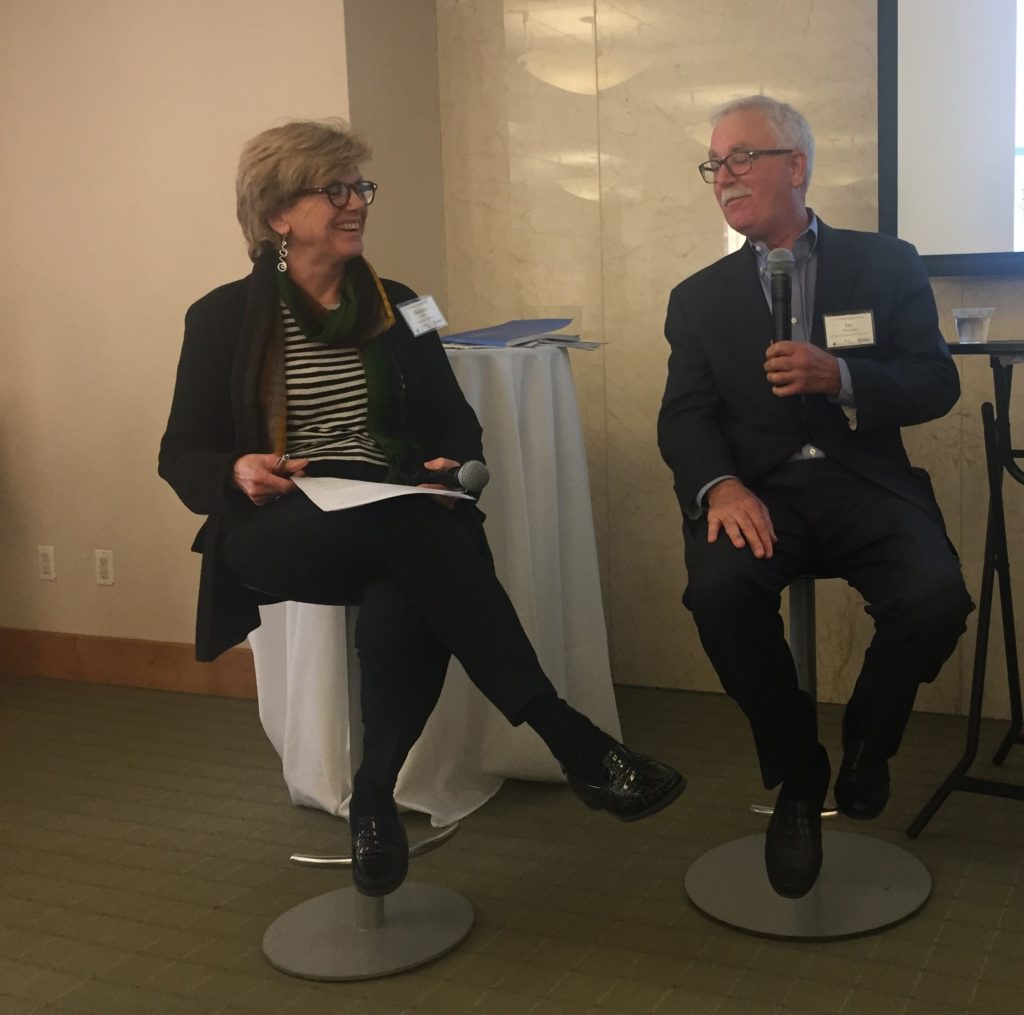Firms United in Desire to Spread Transformative Next Generation Enterprise Model
by Sarah Stranahan

On April 29, 2019, the Fifty by Fifty initiative of The Democracy Collaborative and the NYU Stern Center for Sustainable Business co-hosted the first ever convening of mission-driven, employee-owned businesses. An advisory board—Jay Coen Gilbert from B Lab, Tensie Whelan from NYU Stern Center, Amy Hall from Eileen Fisher, Jeff Hollender from American Sustainable Business Council, and Ian MacFarlane from EA Engineering—worked closely with the Fifty by Fifty team to plan the meeting. It attracted 60 people, including 40 senior executives from more than 20 mission-driven employee-owned firms as well as non-profit leaders, academics, and other experts, who gathered and shared insights about this emerging company ownership and governance design. The key outcome the group sought was building a movement to grow mission-oriented employee-owned firms. These firms, attendees agreed, are the best face for employee ownership and the best hope for preserving mission-led firms.
Ownership Design Research
Fifty by Fifty shared its recent research on employee-owned B corps. Data from B Lab shows that employee-owned companies with embedded social purpose have dramatically superior social and environmental outcomes. The environmental scores of mission-driven employee-owned firms were three times higher than ordinary businesses. These firms outperformed both the worker and overall scores of a control group of non-employee-owned B Corps. The employee-owned B Corps had overall scores double that of ordinary businesses.
The environmental scores of mission-driven, employee-owned firms were three times higher than ordinary businesses.
These companies appear in vastly disproportionate numbers among B Lab’s Best for the World honorees. Among the 45 companies that are both B Corporations and employee-owned, fully 82 percent were named Best for the World in 2017 or 2018.
CEOs Share Insights
Among the highlights of the day was a panel discussion, in which Marjorie Kelly, co-founder of Fifty by Fifty and a leading thinker on business ownership design, interviewed four CEOs: Ian MacFarlane from EA Engineering, Suzanne McDowell from King Arthur Flour, Steve Irvin from the Amicus Solar Co-op, and Mike Sangiacomo from Recology. These leaders shared the different models of employee ownership and mission governance at their companies. They offered insights into why they chose a particular model, as well as some of the benefits and challenges they have experienced managing (or co-managing) a mission-driven, employee-owned firm.
Sangiacomo said, for example, that because of its 100 percent employee ownership, Recology, a waste-hauling and recycling company, has dedicated and engaged employees who maintain excellent relations with customers on their routes. As a result of these deep and positive relationships, San Francisco residents chose Recology to become the ongoing waste hauler/recycler for the city, meaning the firm no longer has to compete with others for this contract.
McDowell, one of three co-CEOs of King Arthur Flour, spoke about employee engagement in decision making, which King Arthur has nurtured through open-book management and designated board seats for employees.
Ian MacFarlane shared the challenges faced at EA Engineering, an environmental consulting firm, when the company went public and traded on NASDAQ. “We were constantly under pressure to increase earnings and growth. It was a relentless nightmare that almost destroyed the company. As an employee-owned company, we once more can focus on long-term plans to advance on our environmental mission.”
15 of the 52 company members of the Amicus Solar purchasing cooperative are now mission-driven and employee-owned.
Steve Irvin talked about the spread of employee ownership in the Amicus Solar Co-op that he heads: 15 of the 52 company members of this purchasing cooperative are now mission-driven and employee-owned. Most converted to employee ownership after joining the co-op, inspired by a small handful of their peer firms. The purchasing group deliberately educates its company members about employee ownership: for example, employee ownership makes it easier to recruit and retain a quality workforce.
Spreading the Model
If there is one major takeaway from the meeting, it is the energy among attendees to spread the model of the mission-led employee-owned firm. Through a group exercise, attendees identified what they considered the best ways to sustain and grow the model. Among these were:
- Spreading the Model: Develop an integrated marketing campaign to spread mission-driven employee-owned ownership and governance designs. And build on the work of state centers to promote employee ownership.
- Sustainability: Continue to build the business case for sustainability.
- Diversity and Inclusion: Support efforts to increase racial and gender diversity in leadership and board roles at mission-driven employee-owned firms.
- Ownership and Governance: Bring together more groups globally working on transformative business design to align efforts to scale and spread best practices.
A smaller group reconvened the morning after the conference to talk about next steps. They reaffirmed the consensus that the mission-driven, employee-owned model of business is powerful and transformative. Attendees agreed that efforts to support and spread the emerging model should continue, and the group should convene again while welcoming others in. The group reiterated its interest in an integrated marketing campaign for mission-driven employee-owned firms and opened a deeper discussion into the value proposition of the next generation design.
“Employee ownership has been around for 40 years and this is really the first time anyone has tried to start a movement,” said Mark Lomele, retired CFO of Recology. “But this is a broader mission here than just promoting ESOPs.”
Shortly after the convening, research by Fifty by Fifty presented at the gathering was featured in Fast Company. Its headline summed up the spirit of the event and how this model of company shows a path for business overall; the headline read: “The Company of the Future is Ethical, Sustainable, and Employee-Owned.”
Sarah Stranahan is senior editorial associate at The Democracy Collaborative, and leads Fifty by Fifty’s research on employee ownership and sustainability.
To follow Employee Ownership News, subscribe to the Fifty by Fifty newsletter or follow us at Medium.
